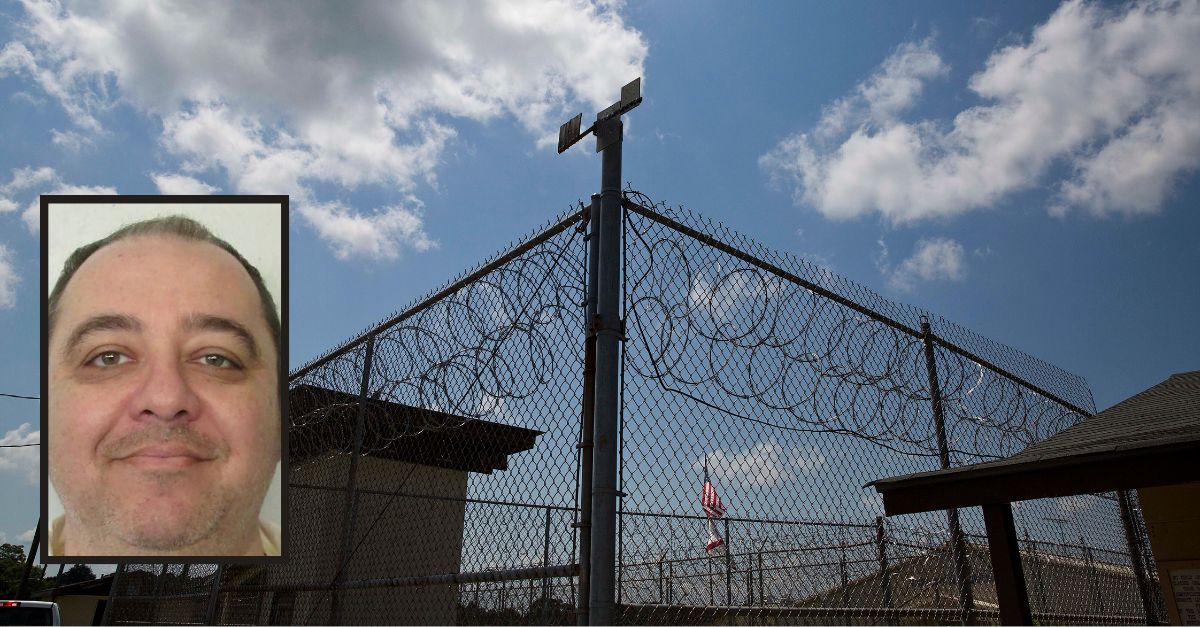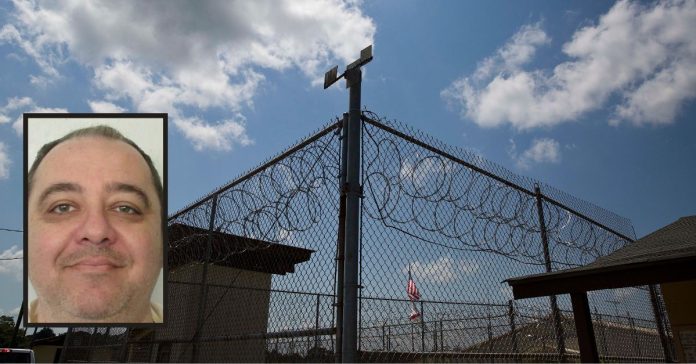
This undated photo provided by the Alabama Department of Corrections shows inmate Kenneth Eugene Smith, who was convicted in a 1988 murder-for-hire slaying of a preacher’s wife. (Alabama Department of Corrections via AP, File)
If all goes according to a court-ordered plan, it will be a first for the United States when at the end of this month the state of Alabama executes Kenneth Eugene Smith by suffocating him to death using nitrogen gas.
His face, a partially redacted and only recently finalized state protocol dictates, will be covered with a mask pressed flush to the skin. Once confirmed to be in place and double checked, amid other criteria and finalizations required under law, nitrogen gas will flow into the mask for at least 5 to 15 minutes until it is clear Smith has flatlined on an EKG monitor. Per a 48-page order obtained by Law&Crime from U.S. District Judge Austin Huffaker in Alabama’s Middle District, Smith is scheduled to die on Jan. 25. Local outlet AL.com notes the window for his execution is between 2 a.m. that day and 6 a.m. on Jan. 26.
Smith has been on death row since 1996 for his role in a gory murder-for-hire plot that left a minister’s wife dead after a vicious beating and repeated stabbing inside her Alabama home in 1988. Smith confessed to his part in killing Elizabeth Sennett, as reported by Law&Crime late last year.
His execution at the end of this month will be the second time the state has tried to impose the death penalty on him.
The first attempt via lethal injection failed in Nov. 2022 when intravenous lines needed for the procedure could not be connected to him properly and the clock ran out on the warrant to execute him. The state moved ahead with plans to execute him again, but that prompted a lawsuit from Smith.
He claimed his experience waiting for death by lethal injection in the execution chamber the first time was agony. He begged the court, U.S. District Judge Austin Huffaker noted in Wednesday’s order, for execution by nitrogen hypoxia as an alternative method.
Huffaker told Smith in his order that he believed the inmate asked to be executed this way in his lawsuit because he was trying to delay his punishment as the state worked out its final protocols for death by nitrogen hypoxia.
Once that was done, Huffaker noted, Smith then changed course and argued that method wouldn’t be appropriate either.
“Now that Alabama is prepared to carry out his sentence using the method of execution he has consistently declared he prefers, the circumstances have changed. And what was once highly unlikely is now a certainty. With that change, Smith now seeks to enjoin the Defendants from carrying out his death sentence using the Protocol, arguing it unconstitutionally superadds pain such that the court should order the Defendants to amend it or execute him by firing squad, a ‘relatively uncommon and archaic’ method,” Huffaker wrote.
Smith’s attempts to waylay his execution were understandable, the judge added.
“It goes without saying that many capital cases come to the federal court system with the primary or sole aim of delaying execution indefinitely. And inherent in many if not every capital case is the condemned inmate’s goal to altogether avoid his death sentence. It is human,” he wrote.
But in Smith’s lawsuit, Alabama’s protocol for nitrogen hypoxia “was not yet approved or fully made known, and he was not yet subject to it,” the judge added.
With that resolved, the judge wrote, there was “simply not enough evidence to find with any degree of certainty or likelihood that execution by nitrogen hypoxia under the protocol is substantially likely to cause Smith superadded pain.”
An attorney for Smith, Robert Grass, did not immediately return request for comment.
Historically, Smith’s attorneys have called the protocols cruel and unusual but Huffaker also addressed this in the order.
Smith was unable to show how this method of execution was particularly cruel.
“Smith is not guaranteed a painless death … Having failed to show a substantial likelihood of success on the merits, Smith is not entitled to injunctive relief on his Eighth Amendment claim,” the judge wrote.
The Associated Press reported Wednesday that a spiritual adviser for Smith decried the decision, saying his horror was an “understatement.”
“The State of Alabama now has the permission of a federal court to suffocate its citizens,” Rev. Dr. Jeff Hood said.
Alabama Attorney General Steve Marshall hailed the decision in a statement Wednesday.
“With today’s order, Alabama is an important step closer to holding Kenneth Smith accountable for the heinous murder-for-hire slaying of an innocent woman, Elizabeth Sennet. Smith has avoided his lawful death sentence for over 35 years, but the court’s rejection today of Smith’s speculative claims removes an obstacle to finally seeing justice done,” Marshall said.
The right to appeal the decision remains open to Smith and if the appeal was allowed forward, his execution could be left to the U.S. Supreme Court to decide.
Have a tip we should know? [email protected]

